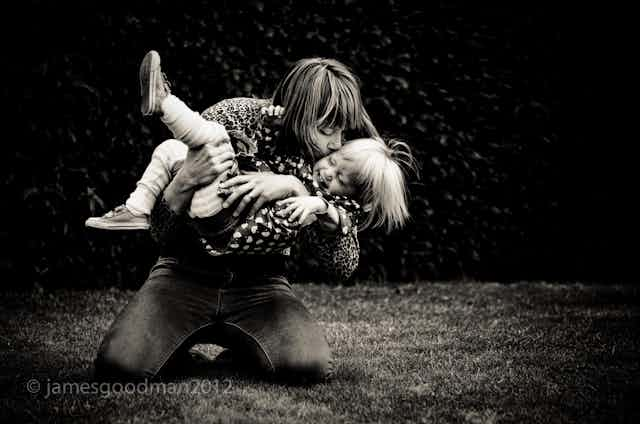I taught myself about orphanages 12 years ago, not actually because of my work as a human biologist but because of my daughter. She was born in 2004 and her first 14 months of life were spent in an orphanage in China.
I am well acquainted with the vast body of research that shows the physical and psychological harms of deprived environments. Orphanages can arguably be placed under this category along with other places such as refugee camps and some hospitals where children lack close contact and attention. Deprivation comes in many shapes and forms: lack of food, diseases, maltreatment, and child abuse are some of the harms that come to mind. However, I would argue that deprivation of love can be just as deadly.
When I started researching orphanages and child health I read the classic works of paediatrician Harry Bakwin, psychologist [John Bowlby](http://apps.who.int/iris/bitstream/10665/40724/1/WHO_MONO_2_(part1.pdf) and psychiatrist Harry Edelston. At the beginning of the 20th century, in the US and the UK, the death rates among infants placed in orphanages, nurseries, and foundling hospitals were, in some cases, close to 100%. London’s Foundling Museum documents in depth these harsh realities. In the 1940s, the work of psychoanalyst Rene Spitz further documented high infant death rates (one out of three) and, among the babies who didn’t die, high percentages of cognitive, behavioural and psychological disfunction.
Most of these deaths were not due to starvation or disease, but to severe emotional and sensorial deprivation – in other words, a lack of love. These babies were fed and medically treated, but they were absolutely deprived of important stimulation, especially touch and affection.
The importance of touch
Human touch is fundamental for human development and survival. Research conducted by Ruth Feldman and Tiffany Field has shown the positive effects that come from skin-to-skin touch in premature babies and that these effects are still at work after ten years. Significant gains in neurological development, weight gain, and mental development of premature babies have been shown to be triggered by skin-to-skin stimulation.
Infants in orphanages can be deprived of touch, individual attention, and love. This happens not because all orphanages are terrible places (although some of them are), but because there are usually too many babies for the staff to manage. In the case of the hospitals, in Europe and the US in the first half of the 20th century, nurses were required to cover their faces with surgical masks and not interact with babies. Parents and other family members were prevented from visiting freely as it was believed this would prevent infections from spreading and help keep babies healthy. However, instead of getting better the babies got worse.
Bakwin understood that this was harmful to the children’s well-being. He stated that “failure of infants to thrive in institutions is due to emotional deprivation”. The term “failure to thrive” is currently used as an umbrella term of conditions, ranging from growth delay, emotional misery and death. It is a generalised health problem seen in high-income and low-income countries although it is more prevalent when poverty and a lack of human resources prevents the babies from receiving emotional and sensorial stimulation (or love) on a daily basis.

My daughter’s story
The reports from our adoption agency guaranteed that the children were well taken care of, fed appropriately, and had toys to play with. But how much sensory stimulation were they given? We knew that the babies were trained, from very early, to hold their feeding bottle on their own. It was not possible to have a carer per child during feeding times.
We flew to China and adoption day finally arrived. Our daughter seemed to be in good health. She adapted herself to us quickly, clearly enjoying the attention we provided, and ate everything we offered. However, on the day we held her for the first time, 90% of the baby girls her age were taller than her. The effects of short height at this age can linger for life and are usually associated with poor health in later life, such as a greater risk of obesity and cardiovascular disease.
Once we got her back home, we were certain that love and bonding would be what she needed most. Three months later, 75% of girls her age were taller than her. Today, at 11 years of age, only 50% of girls her age are taller than her. This is consistent with research that shows a catch-up growth for children who were in orphanages and internationally adopted.
When emotional deprivation and lack of love occur, physical growth slows down or stops. The body enters into a survival mode where vital, basic physiological functions are preserved at the cost of physical, mental, and social development. The longer the child is in survival mode, the more permanent and negative the effects will be. Once a child is adopted and the amount of love, care, and stimulation increases, the body ceases to be in survival mode and will start recuperating.

My husband and I study anthropometry, the study of human body measurements, providing accurate biomedical information on health and nutritional status. We measure our daughter twice a year and compare the results with the World Health Organisation references. But we do not obsess over her measurements. She is a very healthy child, doing well at school in academic subjects, sports, and music. We are now happily bracing for adolescence.
Our daughter’s experience mirrors that of thousands of other babies adopted into loving, well-off families. Increasing awareness on this issue is a step in the right direction, so that more orphaned children receive the happy ending my daughter did.

